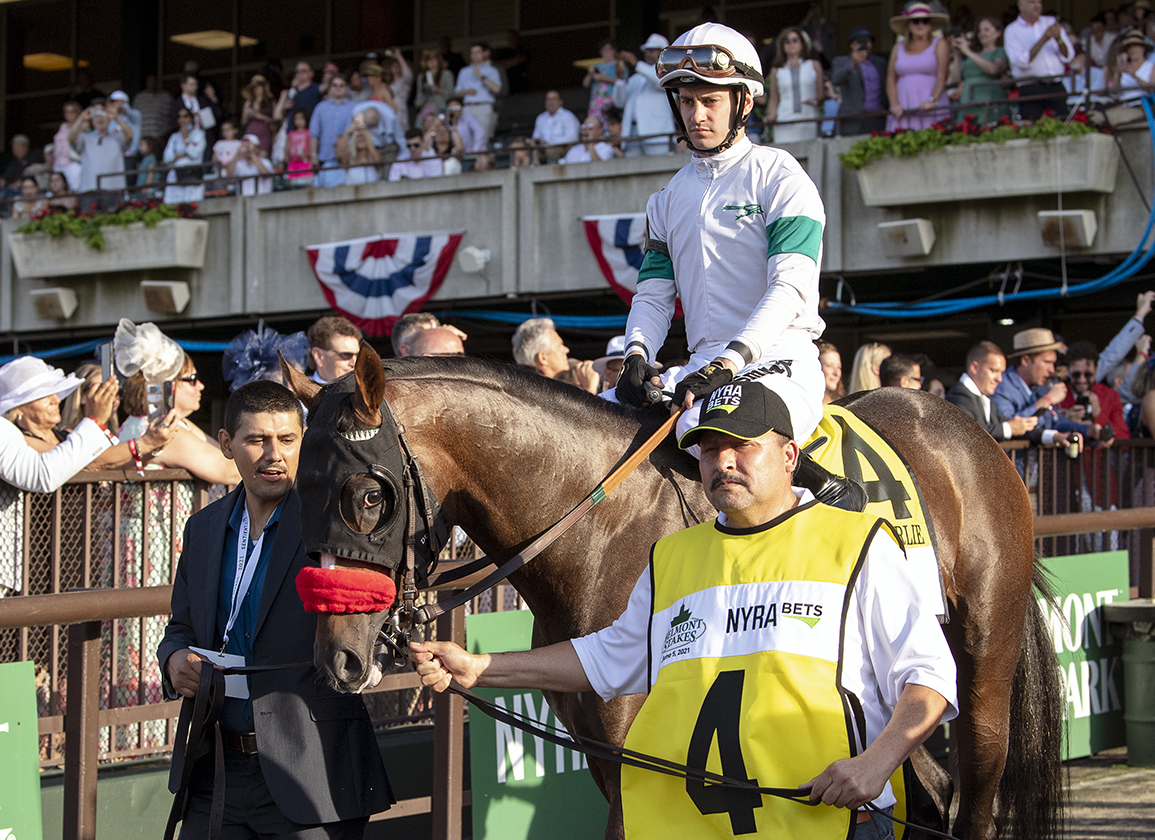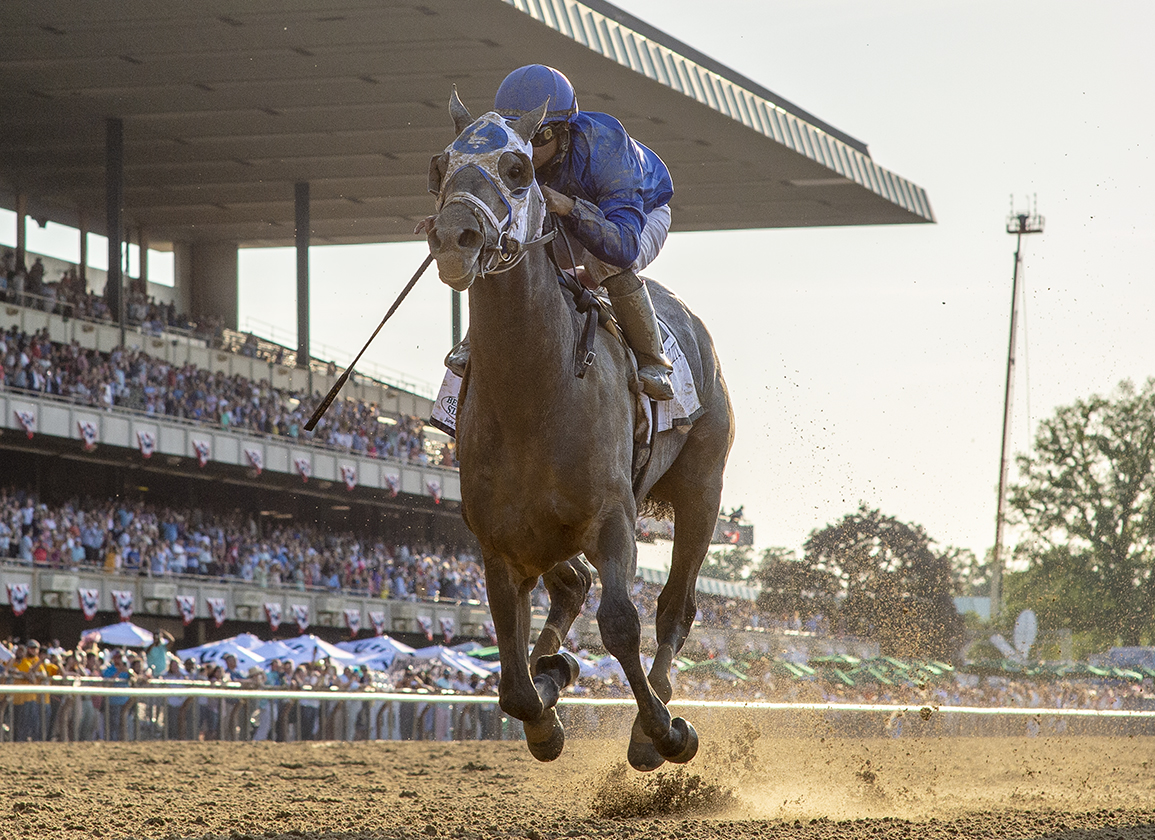And so the dust settles on a Triple Crown in which not a single horse showed up for all three legs, with the one awaiting promotion as “winner” of the GI Kentucky Derby instead resurfacing this weekend in a non-graded stakes at Monmouth.
When they withdrew him from the Classic fray, the Mandaloun (Into Mischief) team obviously had no idea that he might abruptly find himself elevated onto the Derby roll of honor, albeit burdened with an asterisk. But they certainly captured the spirit of the age, one we deplored last week in celebrating the Classics as a historically reliable signpost to the genetic assets we should want to recycle.
To that extent, how we campaign horses actually involves making decisions on the same continuum–namely, the extent to which we're putting it all out there in a way that future generations can trust–as the more notorious ones made over the range of “therapies” today available from science.
From the outside, we can only judge what's happening inside a barn from the animal presented to the public. All of us with a stake in the breed, then, have a duty to try and identify (and, wherever possible, to invest in) those who are palpably working in its interests. So, for instance, owners who choose a barn with an extraordinary strike-rate need to ask themselves what kind of practices they might be supporting in the cause of self-interest.
Now there are certainly trainers who can settle any such questions in coherent and satisfactory fashion. I can think of some, for example, whose excellence has earned them patrons with elite resources in a field lacking due competition: in turf racing, perhaps, or in a pool struggling for depth, as is sadly the case at present in California. But there are other cases so egregious that their patrons should ask themselves whether they would sound any more convincing, after the barn is raided someday, than did those who piously pronounced their shock after the arrests of Jorge Navarro and Jason Servis.
Servis, of course, brought Maximum Security (New Year's Day) to the same race as Mandaloun–Sunday's Pegasus S.–for his first start following wildly contrasting fortunes at the Derby, only to be turned over at 1-20. However things play out for Mandaloun from here, I'm scandalized to hear people urging that the Triple Crown schedule be revised to accommodate the behavior of horsemen today. No sir! No ma'am! A thousand times, no. If the horses we are breeding (or their trainers) aren't equal to the time-honored test, then that's something we all need to know. Rather a weaker Triple Crown series than a weaker breed.

Hot Rod Charlie | Sarah Andrew
Now, so long as it's only a few mavericks of high principle who make a stand on resilience and constitution, then it's going to remain difficult for breeders to make that work at the marketplace. Oxbow, for instance, had begun to seem a pretty impossible commercial proposition by the time he came up with last week's GI Belmont S. runner-up Hot Rod Charlie. But if every other operation could meet the exemplary standards of Calumet, who gave Oxbow a thorough grounding before he ran a superb race in all three Classics, then breeders would know themselves for a fact to be using materials that have been honestly tested. (As it is, of course, very few farms do so–and that confines a branding guarantee to the likes of Oxbow, and others on his roster like Keen Ice and now Bravazo, effectively trading somewhat lesser performance eligibility for unimpeachable toughness.)
I have no idea whether Hot Rod Charlie has arrived in time to bring his sire back from the brink, but I do know that when his own time comes to go to stud, this nugget of a horse will owe his credentials every bit as much to Oxbow as to the remarkable mare who has also given us, in Mitole (Eskendereya), a champion sprinter by another unfashionable stallion.
Because what Hot Rod Charlie did last Saturday was absolute throwback stuff. Maybe he couldn't have done it, but for sitting out the Preakness. We'll never know now, obviously. But you'd like to have seen it tried, because this was one of the most heroic exhibitions of carrying speed in defeat you'll ever see.
As has been widely remarked by now, Hot Rod Charlie's 22.78 opening quarter was the fastest ever recorded in the Belmont S. His 46.49 half was beaten only by a horse called Secretariat. Here, clearly, was the work of a sibling to Mitole. Yet while the two horses who shadowed this pace floundered into oblivion entering the stretch, Hot Rod Charlie responded to the challenge of the crop leader (and that, in terms of accomplishment, is plainly what the superbly professional Essential Quality {Tapit} remains for now) by summoning his inner Oxbow and opening a gap of 11 lengths on the Preakness winner.

Essential Quality | Sarah Andrew
Congratulations, then, to Antony Beck of Gainesway for having secured a place for this extraordinary young horse alongside his champion Tapit, now the only sire of modern times to sire a fourth Belmont winner. (On which basis, as we explored midweek, Tapit stands as a transatlantic foil to Galileo {Ire} himself, in terms of wholesome Classic influences.)
Perhaps the whole Derby trauma might have played out differently had Hot Rod Charlie not allowed Medina Spirit (Protonico) to control such a processional tempo. Regardless, the pluck of “Chuck” is going to land a big one at some point, perhaps on the doorstep of some of his younger owners at Del Mar in November. If so, he could offer the game valuable succour in this time of need. For if the $1,000 yearling who won the Derby has quickly proved a public relations disaster, then a $17,000 short yearling offers a pricelessly accessible combination: an enthusiastic, multi-generational group of sportsmen, on the one hand; and some truly venerable antecedents on the other. (As we've often noted, he's the final legacy of his late breeder Edward A. Cox, Jr.; and was raised at Hermitage Farm by a man, in Bill Landes, who condenses all the sagacity and dignity our business needs so sorely today.)
So let's look on the bright side, as is seldom hard to do with Saratoga and Del Mar on the horizon. Despite continuing legal ructions over the Derby, there are many more welcome “positives” brewing in our environment. For one thing, paradoxically enough in the circumstances, we've just negotiated a first Classic season without Lasix. We have happy crowds restoring vitality to our great occasions. We have a bloodstock market suggestive of impatient demand. And we have a renewed sense of vibrancy and relevance at that cherished bastion of tradition, Keeneland, in a series of flawless appointments starting with that of Shannon Arvin. This regeneration, which has since included the hiring of Tony Lacy and Gatewood Bell, was extended Thursday by the naming of Cormac Breathnach as Director of Sales Operations.
Breathnach will leave a void at Airdrie, but then it was only in measuring up to such a peerless farm that he proved his eligibility for wider responsibility in our industry. Rather like the people who gave us Hot Rod Charlie, Airdrie combines the best of the old school with the dynamism of youth. The standards Governor Jones has established are being scrupulously maintained by his son Bret, as vice-president, and Ben Henley as general manager. And so long as our community has such people in our corner, setting an inflexible premium on integrity and class, we'll keep producing not just the right kind of horses but also the right kind of horsemen.

The post This Side Up: When the Going Gets Tough… appeared first on TDN | Thoroughbred Daily News | Horse Racing News, Results and Video | Thoroughbred Breeding and Auctions.
Source of original post


